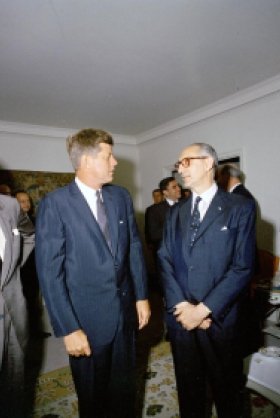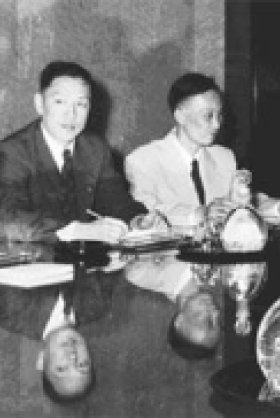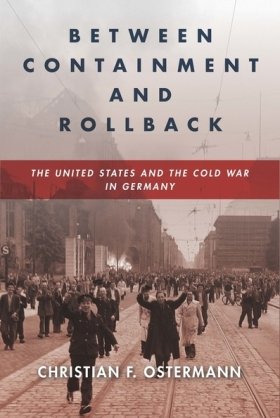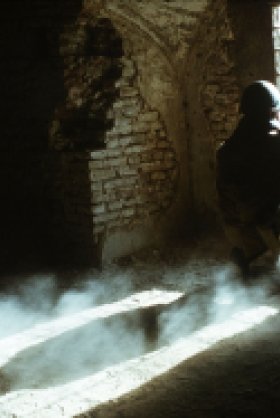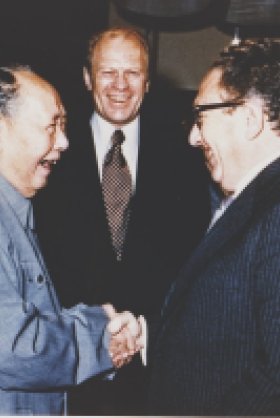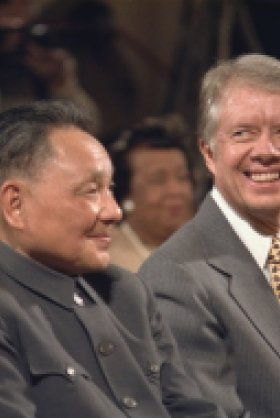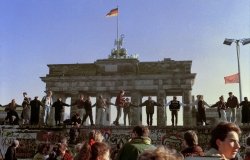Senior CWIHP Scholar Hope Harrison Publishes Op-Ed in German weekly <i>Die Welt am Sonntag</i>
As we approach the 43rd anniversary of the building of the Berlin Wall, most people, when asked, "Whom was to blame for the erection of the Berlin Wall?" would answer: the Soviets. But history is more complex.
On 8 August 2004, Senior CWIHP Scholar Hope Harrison Published Op-Ed in German weekly Die Welt am Sonntag.
The original article can be found at http://www.wams.de/data/2004/08/08/316333.html. An English version is given below.
Moscow Stonewalled Until 1961
As we approach the 43rd anniversary of the building of the Berlin Wall, most people, when asked, "Whom was to blame for the erection of the Berlin Wall?" would answer: the Soviets. This was one of the key points of Egon Krenz's defense in the trial against him and some of his former Politburo colleagues a few years ago. In response to the charge of responsibility for manslaughter at the Berlin Wall, Krenz insisted that the Soviets and the general cold war were to blame, not he or other East German leaders. He even quoted the speech U.S. President Ronald Reagan made in 1987 at the Brandenburg Gate, saying, "Mr. Gorbachev tear down this wall!" Krenz was telling the judge-Ronald Reagan understood the Soviets were to blame; why don't you?
Yet it is clear from the documentary record that in fact the East German leadership of the 1950s and 60s under Walter Ulbricht was at the center of the decision to seal off West Berlin and that the Soviets actually only reluctantly acquiesced. Indeed, Ulbricht lobbied the Soviets persistently for over eight years to agree to seal off access to West Berlin and thus stem the flow of refugees.
In March 1953, two weeks after Stalin's death, the new Soviet leaders rejected Ulbricht's proposal close off free access across the Berlin sectoral border. They argued that the plan was "politically unacceptable and grossly simplistic." Stalin's successors maintained that closing the border would engender anger toward the East German and Soviet regimes among the Berliners and Germans on both sides of the border. They also warned that such an action would "complicate" Soviet relations with the U.S., Great Britain and France, which the Soviets said, "we can and must avoid."
Instead, almost three months later and just two weeks before the 17. June uprising, the Soviets ordered Ulbricht to moderate his harsh socialist policies in a bid for the loyalty of the East German citizens. This was the Soviets' alternative to Ulbricht's proposal to close the border. The Kremlin leaders called for a "New Course" of policy in the GDR. They detailed the ways in which the SED leaders had to make better efforts to improve the living conditions and appeal to all segments of the East German population, including entrepreneurs, farmers, the intelligentsia, churchgoers, artisans, small business owners, and others.
For much of the next several years, Khrushchev attempted to persuade Ulbricht to enact New Course type policies to keep East Germans from fleeing West, while Ulbricht resisted and made it clear he preferred what he perceived as the more direct path, that of simply making Republikflucht physically impossible. Similarly when Khrushchev launched the Berlin Crisis in 1958 in an attempt to compel the West to recognize the GDR and to decrease the pressure (economic, espionage, cultural, etc.) emanating from West Berlin on the GDR, Ulbricht continued to argue that the only sure way to stabilize the situation in the GDR was by closing off the border, not by negotiating (even in a threatening way) with the West.
In the year before the border closure of 13. August 1961, Ulbricht grew increasingly frustrated with Khrushchev's reluctance to allow him to close the border and began to act on his own. In September he unilaterally tightened up the procedures for Western officials and ordinary citizens entering East Berlin. The Soviets were "astounded" and insisted on being "informed in the future about such measures." Summing up GDR polices related to West Berlin, Soviet Ambassador to the GDR, Michael Pervuchin, told the Kremlin leaders that they were "as a rule, unilateral" and consist of "all kinds of limitations concerning movement between both parts of the city . . ." Another official at the Soviet embassy in East Berlin, A. P. Kazennov, informed Moscow that the East Germans "are studying the possibility of taking measures . . . towards stopping the exodus of the population of the GDR through West Berlin. One of such measures by our friends could be the cessation of free movement through the sectoral border . . ."
In response, Khrushchev met with Ulbricht on 30. November 1960 and told him directly that "we cannot now correct the situation unilaterally." Khrushchev was waiting to meet with newly-elected U.S. President Kennedy and had promised he would not change anything in Berlin before they had a summit meeting. The Kremlin leader emphasized that Ulbricht must not make a liar out of him and must be patient.
Ulbricht had no faith that JFK would come to an acceptable agreement with Khrushchev on Berlin and was also watching the numbers of East German refugees increase. 120.230 East Germans fled in 1959 and 182.278 in 1960. The numbers would mount even more in 1961, climaxing with over 1000 leaving a day in July and early August.
In spite of Khrushchev's insistence that Ulbricht not intervene against the refugees until he met personally with President Kennedy, just two weeks before the U.S.-Soviet summit in Vienna, Ambassador Pervuchin urgently notified Soviet Foreign Minister Gromyko: "Our friends would like to establish now such control on the sectoral border between democratic and West Berlin which would allow them to, as they say, close 'the border to the West' and reduce the exodus of the population from the Republic . . ." Pervuchin warned that "our German friends sometimes exercise impatience and a somewhat unilateral approach to this problem, not always studying the interests of the entire socialist camp or the international situation at the given moment. Evidence of this, for example, is their effort to stop free movement between the GDR and West Berlin as soon as possible by any means . . ."
Ulbricht was restrained by the Soviets again, but after the failed Khrushchev-Kennedy summit, Khrushchev finally gave Ulbricht the go-ahead to close the border. Visiting East Berlin just after the summit, Khrushchev's closest colleague, Anastas Mikoian, told the East Germans: "We cannot and must not lose out to West Germany. If socialism does not win in the GDR, if communist does not prove itself as superior and vital here, then we have not won. The issue is this fundamental to us. Therefore, we cannot proceed in such a way with any other country. And this is also the reason the GDR occupies first place in negotiations or in credits."
Thus, the USSR's number one ally finally got its way with the border closure. But Ulbricht's aggressive strategy had worried Khrushchev. He wanted to control the level of East-West tension, not abdicate that control to Ulbricht. Accordingly, Khrushchev did not, as he had threatened the West, sign a separate peace treaty with Ulbricht or turn over to him control of the transit routes between West Berlin and West Germany. Indeed, Khrushchev was concerned that Ulbricht could still provoke tension on the border in Berlin. In late September he told Ulbricht, "such steps which could exacerbate the situation, especially in Berlin, should be avoided. In this connection, it is especially appropriate to abstain from new measures which would change the control order set up by the GDR government on the border with West Berlin." Agreeing to the Berlin Wall was partially Khrushchev's effort to wall in Ulbricht in East Berlin.
Dr. Hope M. Harrison, Associate Professor of History & International Affairs, The George Washington University, and author of Driving the Soviets Up the Wall: Soviet-East German Relations, 1953-1961 (Princeton, New Jersey: Princeton University Press, 2003).
Related Program

Cold War International History Project
The Cold War International History Project supports the full and prompt release of historical materials by governments on all sides of the Cold War. Through an award winning Digital Archive, the Project allows scholars, journalists, students, and the interested public to reassess the Cold War and its many contemporary legacies. It is part of the Wilson Center's History and Public Policy Program. Read more
